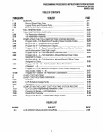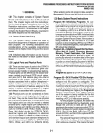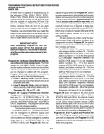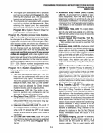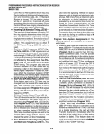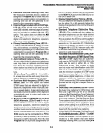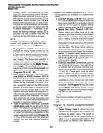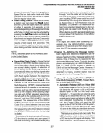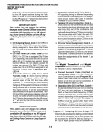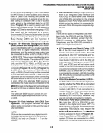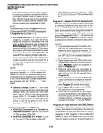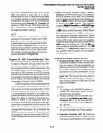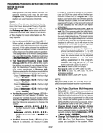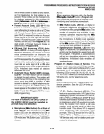
PROGRAMMING PROCEDURES-INSTRUCTIONS/SYSTEM RECORDS
SECTION 100-816-302
MARCH 1993
+ station number. This insures that the mes-
sage LED remains flashing until all VM mes-
sages have been retrieved, at which time the
VM machine should cancel the MW LED by
dialing 6 4 + station number. With Dial 6 4
enabled, MW indications set on a station from
VM ports will not automatically be cancelled
by the DK system when the station calls VM
to retrieve messages. If “Automatic” is se-
lected, the flashing message waiting LED is
canceled any time a station calls the VM
machine and the VM machine answers.
NOTE:
Message Waiting cancel via “Dial6 4 + station
number” only applies to VM ports that have
LEDs 16 and 17 set “ON” in Program 31.
l
Ringing Modes, LED 03-Two
choices are
available for ringing modes invoked by the
Night Transfer button. One choice consists of
the DAY, DAY 2, NIGHTmodes (three modes),
and the other of the DAY and NIGHT modes
(two modes). The three-mode selection is
usefulforalternateansweringpositions.These
modes are switched via the Night Trans-
ferl/Night Transfer2 button on a
telephone or DSS Console (Programs29and
39) which controls CO line ring assignments
(Programs 78 and 81 - 89).
l
Call Forward Override From DSS Con-
sole (DDSS or HDSS) Position, LED 02
(for STRATA DK16 only)-If a station has
activated call forwarding, all calls to that
station will be forwarded to another num-
ber-except for calls from the DSS console
position. A choice exists of whether to call
forward from the console itself or from the
digital or electronic telephone assigned to it.
If the console calls (using the DSS console
station buttons) are forwarded, the atten-
dant telephone will not be forwarded, and
vice versa. This allows the console operator
flexibility in reaching a station user.
l
Tone First/Voice First-DSS Console
(DDSWDSS), LED 01 (for STRATA DK16
only)-The intercom call signal from a DSS
console can be set for Tone First Signaling
or Voice First Signaling, independent of the
system-wide signal option set in Program 1 O-
1. Thus, DSS consoles and their attendant
stations can ring with different signaling
modes.
Program IO-3 System Assignments 3: The fol-
lowing options are available on a system-wide
basis.
LCD BLF Display, LED 20-Turn LED 20
for LCDs to display port numbers when the
Busy Lamp Field (BLF) is activated. LED 20
must be off for LCDs to display default
station numbers when the BLF is activated.
Speed Dial Entry Timeout, LED 19-
Station users can either have up to one
minute or up to three minutes to store Speed
Dial numbers or memos, depending on the
LED 17 setting. If they fail to store the Speed
Dial number or memo within the set time,
their station will automatically exit the Speed
Dial Storage mode and change to the nor-
mal idle state. The three-minute setting is
recommended if station users will frequently
be storing memos with Speed Dial numbers.
QSMU TTY/SMDR Option Select, LED 04
(for STRATA DK8 only)-Selects the func-
tion of the QSMU PCB: LED 04 ON-TTY,
LED 04 OFF-SMDR.
External Amplified Conference, LED 02
(for STRATA DKI 6 only)-Turn LED 02 on
to indicate that an external customer-sup-
plied two-way amplifier is connected to Ports
17 and 18. (These ports must be either
PEKU or PESU electronic telephone ports/
circuits.) The amplifier will amplify two CO
line conference calls. Only one call can be
amplified at a time. Conference calls made
while the amplifier is in use will not be
amplified-See Program 1 O-l (LEDs 19 and
20), Program IO-2 (LEDs 18 and 19), and
Program 15-5 for more information regard-
ing two-CO line conference.
NOTE:
The external amplifiers will also be automati-
cally switched into two CO line DISA line
calls.
Program 12-System Assignments-Basic
Timing:
l
Pause Timing, Code 3-Short and long
pauses may be programmed in Speed Dial
numbers by station users. The length of
short pauses can be set system-wide for
either 1.5 or 3 seconds with Code 3. The
long pause (a different user selection) is
2-6




